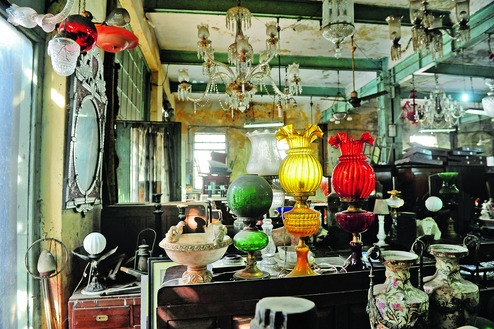



bed that belonged to an old woman living in Sovabazar; a retro telephone; the entrance to the auction house.
Photographs by Subhendu Chaki
The facade of the olden shop on central Calcutta's Russell Street, just off Park Street, isn't very promising. It looks more like a dusty godown than a shop window. Running parallel to what seems like layers of furniture, is a long table laden with mixer-grinders, one old telephone, teapots...
Past two wooden wardrobes, a hutch, two sideboards with glass walls and a coat rack - the kind you find in old PWD guesthouses - we get to the back of the shop. It is there we meet Arshad Salim and Sarfaraz Begum Shamsi, the brother-sister team that runs The Russell Exchange, one of three functioning auction houses of the city. Elder brother Anwar, who is the third wheel, is away in the United Kingdom on work.
Anwar returned to India not long ago after spending 40 years in London. And it is his long-drawn struggle to modernise this inherited trade that has been captured by the British filmmaker, Ed Owles, in the 2014 documentary, The Auction House: A Tale of Two Brothers.
"Ed wanted to shoot a documentary on the auction house, but he had way too much footage," says Arshad. "It was his editor's idea to turn the film into a tale of two brothers."
The film looks into the prickly but warm relationship between the two siblings. In it, Arshad comes across as someone who resisted modernising the auction business.
So was it uncomfortable shooting for the documentary? "No, no, he was never in the way," Arshad assures. Was it interesting? "Yes, yes. Not so much the shooting but the fact that he sent me tickets to each premiere - in London, France, Cairo," he adds, his eyes laughing.
It is not difficult to understand Owles' fascination for the auction house bursting with treasures. All antiques? Apparently, not. By definition, anything made more than a 100 years ago is considered an antique. Something about having to get them certified by the Archaeological Survey of India first. But The Russell Exchange doesn't deal in them.
And how much have things changed about the way they do business? "Not a thing," says Arshad. But there is a lot of furniture with price tags that can be bought any time - earlier, you would have to attend auctions to buy them. The auction house also hires out props and furniture to film and television studios, another recent development.
But what possibly hasn't changed, from the sound of it, is the business ethos. "My father said, control your greed and pay off the money on the day you are supposed to. We have followed it faithfully; that is why we are still here," says Arshad.









.jpg)
.jpg)
.jpg)
.jpg)
.jpg)
He talks about a man from Jadavpur who brought him a pile of books to auction off. The whole lot sold for Rs 65, except for one. It sold for Rs 20,000. "The man took one look at the cheque I gave him and nearly ran out. I caught up with him and told him that the cheque didn't have those extra zeros by mistake. I could easily have pocketed that money but I didn't. After all we have a credibility," he says.
That particular client never returned to the shop, but he sent Arshad a string of customers.
And what sort of people attends the auctions? First, those who like attending auctions; second, those who cannot afford better; and third, out-of-city dealers who pick up objects and sell them for a much higher price.
Have they ever been brought anything they would love to buy themselves? "Yes, many times," says Arshad. "But an auctioneer cannot bid at his own auction. It is said that his hammer will then develop the tendency to come down too fast and it will not be good for the client," explains the man who presided over his first auction when he was 17. "He was then the youngest auctioneer," says his proud sister, breaking her genial silence for the first and only time. The auctioneers collect 20 per cent of the item price as fee.
But the thing to remember is that nothing that fills the cavernous hall of The Russell Exchange actually belongs to the Salims. Not the showcases full of old toys, not the blue and white Chinese plates, not the miniature Wedgwood Jasperware crockery, not the crystal vases, the marble busts, nor the ugly paintings. It is just a station they have stopped at during their journey from one home to another. And as at a station, a saunter is fascinating.
The eye is drawn to a series of sturdy bookcases stocked with beautifully bound books. The book-filled cases - an entire row of them - belonged to a woman from Sovabazar.
Why did she have to let go of them? Perhaps the old library outgrew its last address. Or maybe she vacated this world for the next and her possessions had to yield place as well.
The next thing that draws the eye is a half-length mirror, framed in curlicues of wood. It is in the landing of the stairs that lead to the mezzanine floor that promises further riches. The mirror is thick, bevelled, blemish free. Its frame, dark, glossy wood. Did it adorn some grand bungalow before this or some zamindar's nautch room? Do mirrors have memories of all those whose reflections they once held? Who knows.
But speaking of mirrors, one remembers what Owles had to say of The Russell Exchange at the Cairo Film Festival. He said it mirrors the chaotic, crowded city outside its doors.










